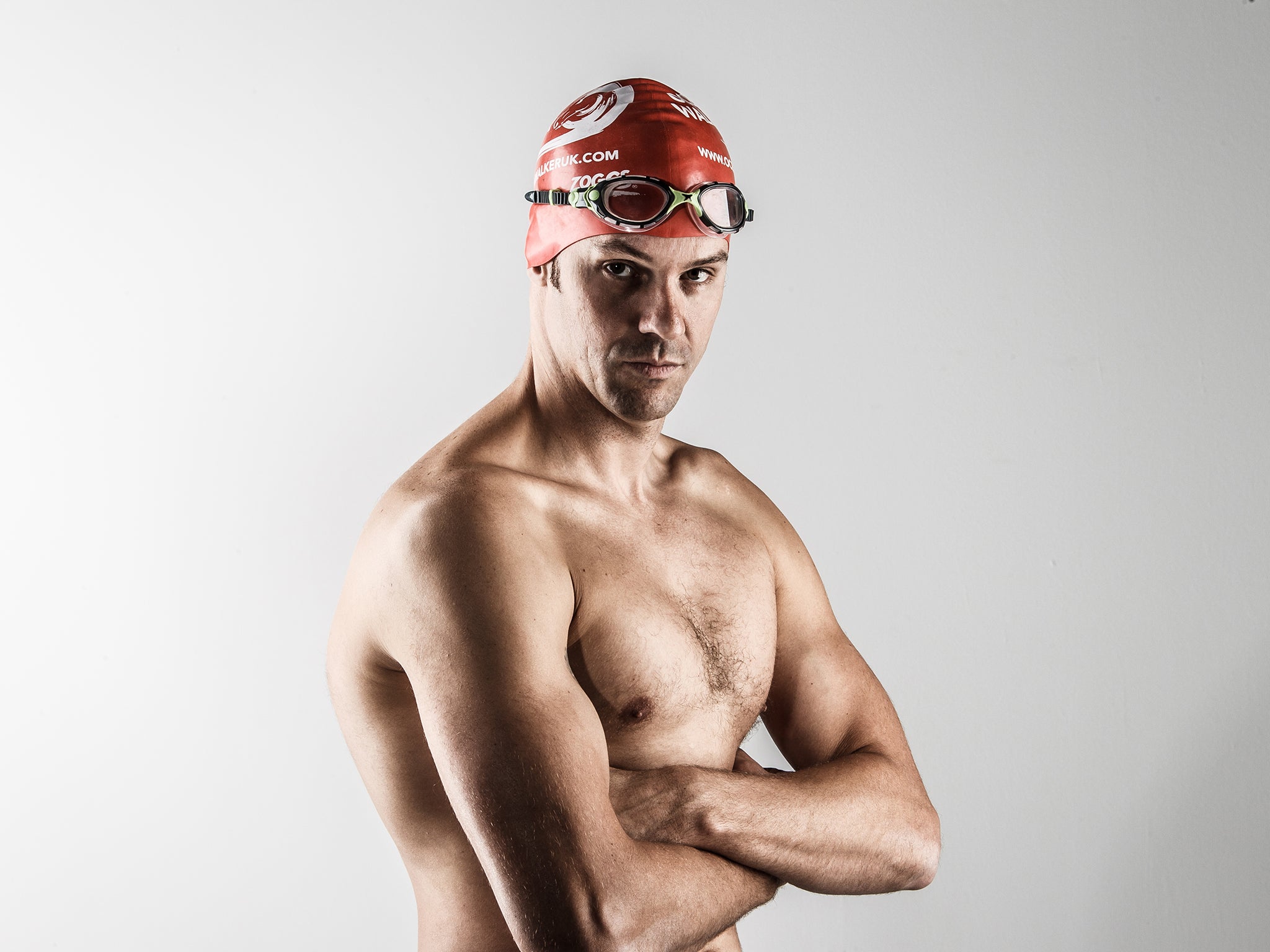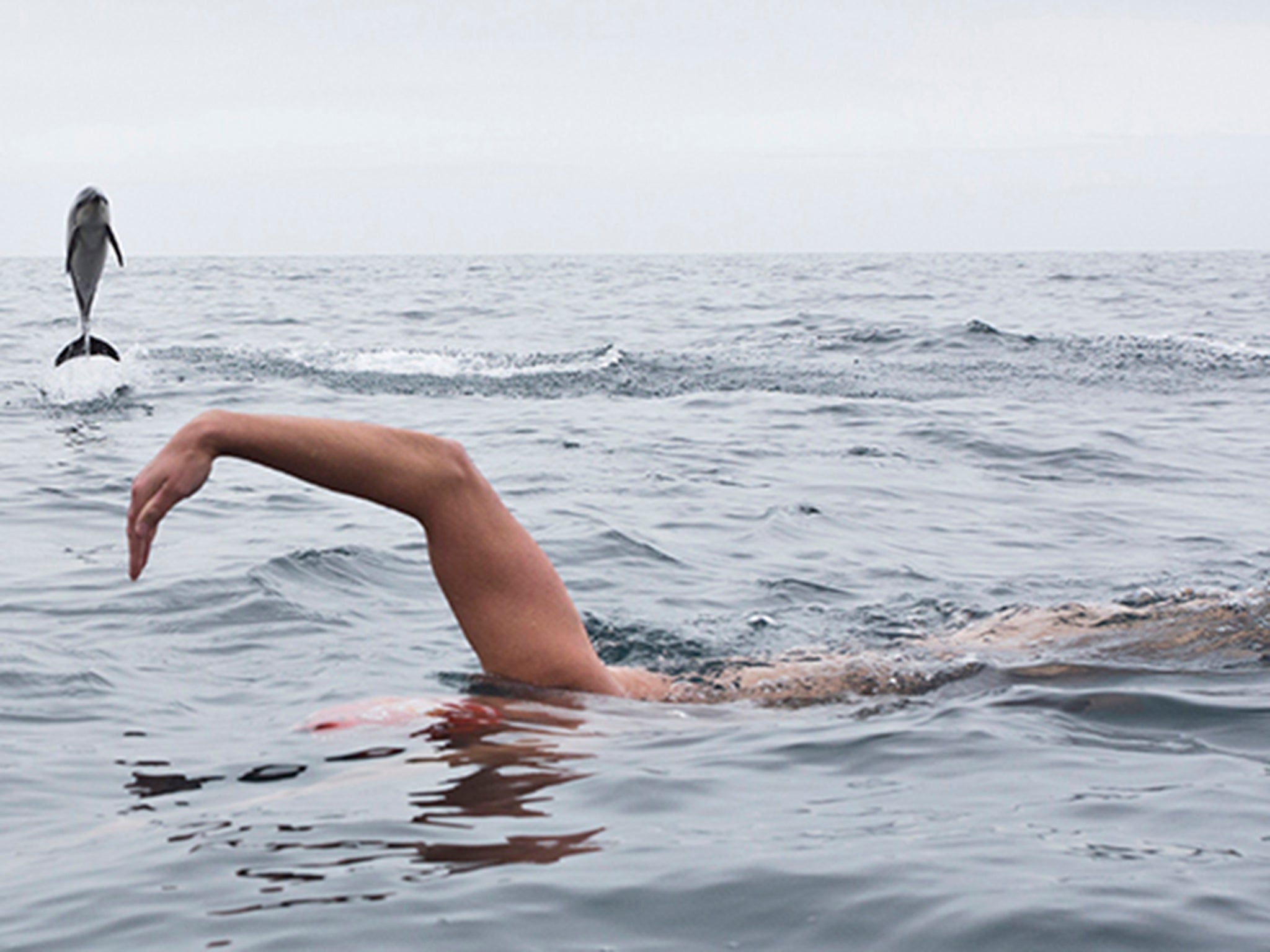Oceans Seven challenge: Swimmer Adam Walker describes completing one of the world's toughest physical challenges
Walker has battled ice-cold waters, been stung by a Portuguese man o’war and rescued from a shark by a pod of dolphins

Your support helps us to tell the story
From reproductive rights to climate change to Big Tech, The Independent is on the ground when the story is developing. Whether it's investigating the financials of Elon Musk's pro-Trump PAC or producing our latest documentary, 'The A Word', which shines a light on the American women fighting for reproductive rights, we know how important it is to parse out the facts from the messaging.
At such a critical moment in US history, we need reporters on the ground. Your donation allows us to keep sending journalists to speak to both sides of the story.
The Independent is trusted by Americans across the entire political spectrum. And unlike many other quality news outlets, we choose not to lock Americans out of our reporting and analysis with paywalls. We believe quality journalism should be available to everyone, paid for by those who can afford it.
Your support makes all the difference.According to extreme swimmer Adam Walker, there’s only one thing worse than hypothermia: being stung by a Portuguese man o’ war. I’m inclined to take his word for it; Walker has, after all, experienced both.
In 2008, Nottingham-born Walker swam the English Channel in 11 hours, 35 minutes. Over the next seven years, he would swim six more stretches of water, completing the Oceans Seven – one of the most extreme physical tests in the world – becoming the first British person to do so, and one of only six in the world. Along the way, he battled exhaustion, sickness, and persistent mental demons – as well as fearsome marine life and extreme weather. Now, he’s written a book detailing his experiences.
We meet in a café in Soho on a bitter January morning. As we shake hands, I mention the cold weather before remembering that the word “cold” is no longer part of Walker’s vocabulary. Erasing the term from his mind was one of the techniques he used to spur himself on while swimming in chilly waters. “It is negative and serves no positive purpose in the sport of open-water swimming,” he writes in the author’s note of his book.
I later learn that cancelling out negative thoughts (“I’m cold”, “I’m tired”) with positive thoughts (“I’m strong”, “I can do this”) was critical to Walker’s success. Swimming in rough seas for 17 hours straight requires more in the way of mental fitness than it does physical stamina, he says.

Walker, 37, hasn’t always wanted to be a swimmer. Competitive by nature, initially he had dreams of becoming a professional rugby player or cricketer, before a recurrent knee injury scuppered his chances. He went on to compete in swimming competitions, favouring the backstroke. His tricky knee, though, meant he was never going to find the speed necessary to compete at a professional level. Walker’s dreams of becoming a sportsman were slipping away.
It was a film that first inspired him to swim the English Channel. Walker was on an aeroplane on his way to visit family in Australia when he watched On a Clear Day, the fictional tale of a man swimming the Channel. He describes this as his light-bulb moment. He was transfixed. “It was indescribable,” he says. “I realised I wanted to do something really memorable in my life.”
He began training as soon as he returned from Australia, practising first in an indoor pool before deciding to assess his capabilities in cold water – an experience that almost proved fatal. In February 2007, Walker visited the National Water Sports Centre in Nottingham, determined to test his mettle in its bitterly cold lake. The water temperature was just 9.7C, around 5-6 degrees cooler than the English Channel would be when he would swim it in summer.
Against advice, Walker swam 2,000 metres in the freezing lake. In his book, he describes how his arms began to feel like lead weights, clawing through the water, and he quickly became disoriented and paranoid. He knows now that this was the onset of hypothermia.
“It feels like you’re freezing from the inside,” he tells me, matter-of-factly. “Your body is cold from the core. That first time was very bad. I was close to dying. The paramedics said I was probably two minutes away from going under.”
You’d be forgiven for thinking Walker might have reassessed his plan to swim the Channel following his brush with death. In reality, it only made him more determined to succeed. Water temperature was something he trained himself to tolerate – like training a muscle, he says. “I don’t think you can ever fully combat the cold,” he tells me. “You actually look forward to urinating because it’s 98 degrees.”
As well as urinating in the water, Walker was frequently sick as he swam. He was fed from an accompanying boat (rules state swimmers are not allowed to touch the boat, but can be passed sustenance from it), and relied on flat Coca-Cola and carbohydrate powder to settle his stomach and fuel his swimming.
After completing his English Channel swim in July 2008, he swam the Strait of Gibraltar in 2011, becoming the first British person to swim from Spain to Morocco and back. The North Channel, the Cook Strait, the Molokai Channel, the Catalina Channel and the Tsugaru Strait followed, to make up the Oceans Seven. “They were more than just swims to me,” he says. “They gave me something that life didn’t at that time. I felt like somebody when I was in the water.”
Walker becomes increasingly animated as he talks about his swims, though there’s no doubt the challenge has taken its toll on him physically. As we talk, he points to various body parts, listing the operations he’s had. His shoulder in particular proved troublesome after he ruptured his biceps tendon while swimming the English Channel. At one stage, in the middle of the challenge, a specialist told him he would never swim again. Undeterred, Adam invented a new stroke, the “Ocean Walker”, using his stomach muscles and the rotation of his hips to push his arms forward, rather than throwing them over his head. The stroke allowed him to keep swimming. He now teaches this technique all over the world. (The tennis player Novak Djokovic is one of his clients.)
An hour into our meeting, I’m struck by his tireless, dogged determination. I ask what it would have taken for him to give up on a swim. “I couldn’t allow myself to think that way,” he says. “There was never a question of not finishing.” Not even when he was stung by a Portuguese man o’ war, I ask? “No,” he says, with a wry chuckle. “Not even then.”
The sting came when Walker was 13 hours into his third swim, the Molokai Channel, in Hawaii. The crossing had been fairly uneventful; the only minor panic coming when Walker’s shark deterrent – which he wore round his ankle – ran out of batteries. Suddenly, he felt something slash his stomach. “I felt like I was on fire,” he says. “It was the worst agony I’ve ever had in my life. I pulled the tentacles off, which I later learnt went against medical advice. They say you should go to hospital immediately. Nowhere does it say you should swim for a further three and a half hours. My brain told me I was finished.”
The toxins in the tentacles of a Portuguese man o’ war are about 75 per cent as powerful as cobra venom and one sting can cause major organs to shut down. Pins and needles started to creep up Walker’s neck and his spine went numb. He couldn’t flatten himself out in the water and his legs became useless, hanging in the current beneath him. He resorted to heaving himself forward using his arms, which were already weak from swimming.
Up until that point, Walker says, he had told himself he could overcome any misfortune thrown at him using willpower and strength of mind. But as he floated – doubled over in agony – in the Pacific Ocean, unsure what had attacked him, a negative thought entered his head. “It was of me paralysed on the boat,” he says, grimly. “I just saw myself sinking.” Miraculously, or perhaps through sheer bloody-mindedness, Walker swam for another three and a half hours to complete the challenge.
It wasn’t all bad, though. The best swim, he tells me, was the Cook Strait, in New Zealand, where he was followed by a pod of dolphins, which he claims protected him from a shark. “The dolphins went straight into formation and kind of guided me forward,” he says. “I happened to glance down and that’s when I saw the shark. I could tell it was a shark because it was much thinner and the way it was moving was different. I just told myself to look at the dolphins instead. I felt so protected.”
The completion of the Oceans Seven came at a price, however. Halfway through the challenge, Walker’s marriage broke down, though he claims this was not as a result of his swimming. At the time, he was training at the same level as an Olympian as well as trying to raise the funds to cover the costs of his flights, accommodation and swims – all while working a full-time job in sales. “Things happen in life and people drift apart,” he says.
Unsurprisingly, Walker is refreshingly positive about this period in his life. Everything happens for a reason, he tells me.
What next? Well, with seven swims completed and the book written, Walker has taken up an even bigger challenge: to get Britain swimming again. “It would be so wrong for me to do all this and then go to ground,” he says, modestly. “I need to educate people about the benefits of this sport. It’s done so much for me.”
‘Man vs Ocean’ by Adam Walker (John Blake, £17.99) is out now adamwalkeroceans7.co.uk
Join our commenting forum
Join thought-provoking conversations, follow other Independent readers and see their replies
Comments